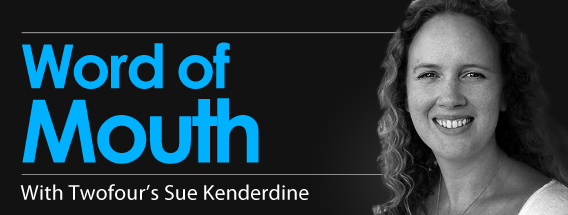
This week, we chat to Twofour’s Head of Talent, Sue Kenderdine, on producing multi-media content and working in extreme conditions with members of the royal family.
How did you get your break in TV?
I came to TV quite late after writing speculatively to a small Indie that was expanding, my timing was good and I became PA to the MDs.
Twofour also have offices in Abu Dhabi and Los Angeles as well as London and Plymouth – do you regularly collaborate with them?
Being based in the head office in Devon, I split my time between there and the London office and with Leeanne Vinson, our Talent Exec, we work alongside the other bases to try and ensure the right people are on the right teams’ radar!
What is a typical day for you as Head of Talent at Twofour?
I talk to the Executives, Series Producer and PMs and constantly assess what needs to be crewed and by when. It could be anything from fixed rig shows like Educating Yorkshire to entertainment shows like Splash! and business / features series with Alex Polizzi as The Hotel Inspector to serial killers on Born to Kill. Amongst other things, it involves lots of CVs, talking to and meeting with freelancers, managing our talent database and being involved in our schemes.
Twofour just won an award for Channel 4’s Paralympics website – how important do you think it is that you now work across multi-platform mediums and incorporate different types of media?
Twofour has an established multi-platform and digital division producing video, events and online channels for brands, broadcasters and the public sector. This means we have a broadened skillset in house, a deep understanding of our audience, and we’re able to offer broadcasters two-screen and multiplatform propositions. The last few years have been an exciting time for the industry.
You have just been commissioned to film Prince Harry and wounded servicemen and women on an expedition to the South Pole. With such a high profile figure, how does this affect the pre-production planning stages and looking to hire crew? For example, do crew have to pass rigorous security checks?
The teams on our military films, particularly with HRH Prince Harry tend to be very small, and of course, highly security checked. Also, due to the nature of the programmes they need to be incredibly fit to not only go on the expeditions but to film at the same time! It’s a tiny pool of highly trusted and talented producers and directors.
After a project is greenlit, how soon do you start looking for crew?
We try and think of team ideas from the moment we hear it being mentioned in development to get a head start because as with all things, timing is everything so the more preparation we can do, the better. We are always keen to know when people are coming free – even if it is in 6 months’ time.
Broadcasters like the BBC have a target to ensure that at least 50% of its shows are produced outside Greater London. Do you think having an office in Plymouth gives your company an advantage?
Twofour is unique because its Head Office is in Devon, and it is something we are proud of. We have a wealth of really talented people who work here and we try hard to employ and retain people from the area and to bring as much work as possible to the regions.
What would your advice be to all those who have just graduated and are looking to start their careers within the industry?
Most importantly, watch TV. Watch everything! Research into which companies make the programmes you love and see which schemes they do and if they offer work experience, if they have job pages or a database to upload your CV. Write to the talent managers and execs who make the programmes you like. See which companies do schemes and internships, attend any networking events, learn to drive, try and gain any experience you can and be persistent.
In the coming years, how do you think the talent departments will develop and change?
I think the internet, social media and databases will continue to develop and help shape the way that information is shared and stored but that essentially talent management is a job for people who love working with people and who are genuinely keen to try and get people employed and I think that will remain constant.
Sue Kenderdine is Head of Talent at Twofour.